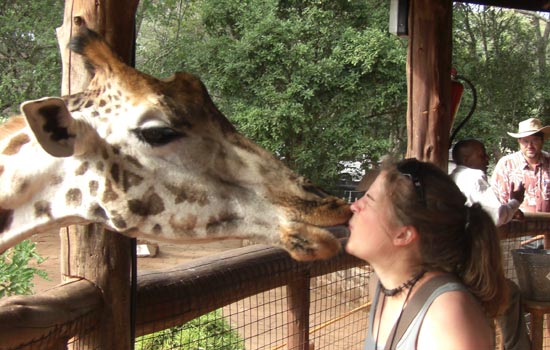Student stays the course until the job’s done
Photo submitted by Becca Nelson
Becca Nelson, pictured here in a lighter moment with a giraffe, has spent the past several months in Africa using the skills she’s acquiring in her degree program to help the people of Kenya.
Becca Nelson has taken the term distance learning to a new level.
Nelson has been pursuing her master’s degree while conducting missionary work in Nairobi, Kenya—taking the skills she’s learning in her virtual classroom and putting them right to work in a real-life setting.
“Because I’m in the professional studies program, I’m crafting my own degree based on things that I want to know and learn,” says Nelson, who is teaching pastors and laypeople from churches in impoverished areas how to use computers in addition to designing Web sites for a number of ministries.
“The classes I am taking for my degree are in design and in project management—just what I needed to learn.”
Nelson had originally planned on returning to RIT for the start of the spring semester. However, she still saw much work to be done in Kenya. That’s where the flexibility of her degree program came in. Instead of coming home, she enrolled in online classes.
“The online classes have enabled me to stay until my students are comfortable working on their own sites and until the projects I’m starting are ready to sustain themselves,” she says.
Nelson will begin most of her classes at 2 a.m. That’s when Internet service is fastest.
Managing her studies has been the least of Nelson’s worries since arriving in Kenya on Jan. 13. Violence erupted in the country in late December following the results of a controversial presidential election that many observers feel were tainted. More than 1,000 people were killed and hundreds of thousands fled ethnically mixed areas.
While Nelson says that the situation has improved in recent weeks, she has encountered danger.
Every morning, Nelson rides a bus called a matatu (public minivan) to her classroom. One morning, shortly before arriving at her classroom, she overheard a radio report saying the street where she taught was closed and that clashes had led to the area being sprayed with teargas. Quickly, she changed buses and returned to her room at Africa Nazarene University.
“I was afraid because I was almost there,” Nelson says. “I was shaken up, thinking, ‘What if I hadn’t heard the radio report?’”
But despite the trying circumstances, Nelson has enjoyed her experience.
“I’ve gotten to kiss giraffes, touch orphaned baby elephants, eat new foods and make great new friends,” she says. “And seeing my students go from a fear of computer viruses—they thought they could physically catch one themselves—all the way to a love of technology has been fulfilling.
“Now, pastors who before couldn’t use a mouse or keyboard are able to make Web sites and do other things needed to sustain their own ministries.”
One of Nelson’s favorite projects is the Web site she’s working to build that will sell local crafts in an effort to raise the funds necessary to build a school. The school will charge students who can afford it $4 a month. For each two students who can pay, one orphan can come for free. Teachers in the school are volunteers, which frees up enough money to buy porridge for the students every morning.
Nelson plans to return to the United States in mid-April. As that date approaches, she feels increased pressure to accomplish her goal of setting up programs that will continue after her departure.
“Sustainability has been the song since the beginning,” she says. “I’m not here to offer free training and then leave things the way they were when I arrived.”







